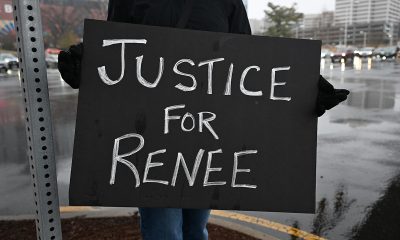National
Parole denied for man who murdered gay sailor in 1992
Commission receives more than 100 messages opposing release of killer

A five-member U.S. Parole Commission voted 4-1 on March 7 to deny parole to a former U.S. Navy sailor sentenced to life in prison for the 1992 anti-gay murder of fellow U.S. Navy sailor Allen Schindler while the two were stationed in Japan.
The decision by the Parole Commission, which is an arm of the U.S. Department of Justice, came 18 days after a Feb. 17 hearing in which one of its members issued a recommendation that former Navy Airman Apprentice Terry M. Helvey be approved for parole and released from prison Oct. 26, 2022.
Schindler’s surviving mother, sister, and niece, who strongly opposed parole for Helvey, noted that the one commission member’s recommendation for parole marked the first time such a recommendation had been made in the 29 years since Helvey pleaded guilty to the murder in exchange for an offer by military prosecutors not to seek the death penalty.
After becoming alarmed that the commission might approve parole, for which Helvey has applied and for which he has been denied nearly every two years for the past 20 years, the Schindler family members immediately reached out to the LGBTQ community and others asking people to send email messages and letters to the Parole Commission opposing parole for Helvey.
Kathy Eickhoff, Schindler’s sister, told the Washington Blade that a Parole Commission staff member informed her that the commission received at least 110 email messages and over 30 phone calls from members of the community expressing strong opposition to parole for Terry Helvey.
In response to a request by the Blade for the reason why the Parole Commission denied parole for Helvey at this time, Nicole Navas Oxman, a commission spokesperson, said the “USPC found that one of the criteria to deny parole at 18 U.S.C. Section 4206 (d) applied to his case.”
Navas Oxman was referring to a section of the federal law that sets criteria for eligibility for parole for people serving in federal prisons. The section to which she referred says prisoners serving a term of more than 45 years, including a life term, become eligible for parole after serving 30 years.
But the section also states, “Provided, however, that the Commission shall not release such prisoner if it determines that he has seriously or frequently violated institution rules and regulations or that there is a reasonable probability that he will commit any Federal, State, or local crime.”
Navas Oxman did not say which of the two disqualifying criteria the Parole Commission invoked to deny parole for Helvey. But Eickhoff, Schindler’s sister, has said that Helvey has cited his good behavior and involvement in prisoner education and mentoring programs as reasons why he should be approved for parole. That would suggest that the Parole Commission denied parole for Helvey because it believes there’s a “reasonable probability” that Helvey could commit a crime if he’s released.
When asked if the large number of email messages and phone calls from members of the community opposing parole for Helvey played a role in the commission’s decision, Navas Oxman said only, “The commission made its decision after reviewing all of the information in his case file.”
At the time of the murder, Naval investigators disclosed that Helvey and another one of Schindler’s shipmates, Airman Charles Vins, attacked Schindler on Oct. 27, 1992, in a men’s bathroom at a public park in Sasebo, Japan near where their ship, the U.S. Bellow Wood, was docked.
According to a Naval investigative report, a witness saw Helvey repeatedly stomp on Schindler’s head and body inside the bathroom. An autopsy later found Schindler’s head and face were crushed beyond recognition, requiring that his body be identified by a known tattoo on his arm.
The attack and murder took place after Schindler, 22, had been subjected to harassment and threats of violence on board the ship when rumors surfaced on the ship that Schindler was gay, and the ship’s captain ignored Schindler’s request for protection, according to information that surfaced after the murder.
One of the Naval investigators presented evidence that Helvey admitted to disliking Schindler when Helvey was interrogated shortly after his arrest. “He said he hated homosexuals,” the investigator said in a report, quoting Helvey as saying, “I don’t regret it. I would do it again…He deserved it.”
Helvey was sentenced to life in prison after he accepted the offer to plead guilty with prosecutors saying they would not seek the death penalty, which could have been pursued under military law.
Vins, the other sailor implicated in Schindler’s murder, argued through his lawyer that he was an accomplice to the murder but did not physically assault Schindler. He pleaded guilty to three lesser charges, including failure to report a serious crime, as part of a separate plea bargain offered by prosecutors. He was sentenced to one year in prison and was released after serving 78 days.
Eickhoff, Schindler’s sister, said she, her daughter, Cheryl Lagunas, who was 7 years old when her beloved uncle was murdered, and their mother, Dorothy Clausen, have been going through a parole hearing ritual every two years for nearly the past 20 years by submitting testimony and often attending the parole hearings for Helvey to express their opposition to the parole.
The most recent hearing on Feb. 17, in which one of the Parole Commission members recommended parole, was held at the Federal Correctional Institution in Greenville, Ill., where Helvey is currently being held as an inmate.
“I just want to thank everyone who wrote a letter for my Uncle Allen,” Cheryl Lagunas stated in a March 7 Facebook posting. “I am so happy to share that today Terry Helvey was DENIED PAROLE…I am overjoyed and so appreciative of all of you,” she continued.
“Terry Helvey will have another parole hearing in 2 years, 2024. So, I’m hoping to count on you guys again, for this unfortunately [is] never over,” she wrote. “All my love to you guys xoxo – Cheryl.” Next to her name, Cheryl Lagunas added a drawing of a hamburger wrapped inside a bun with cheese on it.
“The cheeseburger after her name is because Allen called her his little cheeseburger,” her mother told the Blade.
Longtime gay activist Michael Petrelis of San Francisco has been credited with leading efforts to pressure the Navy into releasing information about the Schindler murder, the anti-gay threats that Schindler faced on his ship and calls for the Navy to officially confirm that the motive of the killing was anti-gay hatred that activists say the Navy withheld at the time of the murder.
Much of the information that observers believe the Navy withheld from the public was confirmed in a 900-page Naval investigative report that Petrelis released in 2015 after he obtained it through a Freedom of Information Act request.
“The brutal death of Allen Schindler for daring to live authentically as a gay member of the U.S. Navy before the ban on LGBT people was lifted, at the hands of Terry Helvey, who pleaded guilty to the murder, demands that for justice to be served he remain incarcerated,” Petrelis said in a statement.
“It would have been an outrage if the U.S. Parole Commission granted him release around the date 30-years ago when Schindler was killed out of hatred,” Petrelis said. “My thoughts are with Allen’s mother Dorothy, sister Kathy and their family.”
Eickhoff said that during his Feb. 17 parole hearing, Helvey, who is now 50 years old, expressed remorse as he has in previous parole hearings for what he did 29 years ago and claimed he is a different person.
She said the parole commission member who conducted the hearing stated that 30 years of incarceration in a federal prison, which Helvey will have completed on Oct. 26 of this year, when the commission member recommended he be approved for parole, sometimes becomes a threshold for when a prisoner becomes eligible for parole under federal law.
Noting that she and her family will once again go through the process of opposing parole for Helvey in 2024, Eickhoff added, “Twenty-nine years ago, we thought that was it” when Helvey was sentenced to life in prison. “But no, that’s not what happened.”

The Comings & Goings column is about sharing the professional successes of our community. We want to recognize those landing new jobs, new clients for their business, joining boards of organizations and other achievements. Please share your successes with us at [email protected].
Congratulations to Gil Pontes III on his recent appointment to the Financial Advisory Board for the City of Wilton Manors, Fla. Upon being appointed he said, “I’m honored to join the Financial Advisory Board for the City of Wilton Manors at such an important moment for our community. In my role as Executive Director of the NextGen Chamber of Commerce, I spend much of my time focused on economic growth, fiscal sustainability, and the long-term competitiveness of emerging business leaders. I look forward to bringing that perspective to Wilton Manors — helping ensure responsible stewardship of public resources while supporting a vibrant, inclusive local economy.”
Pontes is a nonprofit executive with years of development, operations, budget, management, and strategic planning experience in 501(c)(3), 501(c)(4), and political organizations. Pontes is currently executive director of NextGen, Chamber of Commerce. NextGen Chamber’s mission is to “empower emerging business leaders by generating insights, encouraging engagement, and nurturing leadership development to shape the future economy.” Prior to that he served as managing director of The Nora Project, and director of development also at The Nora Project. He has held a number of other positions including Major Gifts Officer, Thundermist Health Center, and has worked in both real estate and banking including as Business Solutions Adviser, Ironwood Financial. For three years he was a Selectman, Town of Berkley, Mass. In that role, he managed HR and general governance for town government. There were 200+ staff and 6,500 constituents. He balanced a $20,000,000 budget annually, established an Economic Development Committee, and hired the first town administrator.
Pontes earned his bachelor’s degree in political science from the University of Massachusetts, Dartmouth.
Kansas
ACLU sues Kansas over law invalidating trans residents’ IDs
A new Kansas bill requires transgender residents to have their driver’s licenses reflect their sex assigned at birth, invalidating current licenses.

Transgender people across Kansas received letters in the mail on Wednesday demanding the immediate surrender of their driver’s licenses following passage of one of the harshest transgender bathroom bans in the nation. Now the American Civil Liberties Union is filing a lawsuit to block the ban and protect transgender residents from what advocates describe as “sweeping” and “punitive” consequences.
Independent journalist Erin Reed broke the story Wednesday after lawmakers approved House Substitute for Senate Bill 244. In her reporting, Reed included a photo of the letter sent to transgender Kansans, requiring them to obtain a driver’s license that reflects their sex assigned at birth rather than the gender with which they identify.
According to the reporting, transgender Kansans must surrender their driver’s licenses and that their current credentials — regardless of expiration date — will be considered invalid upon the law’s publication. The move effectively nullifies previously issued identification documents, creating immediate uncertainty for those impacted.
House Substitute for Senate Bill 244 also stipulates that any transgender person caught driving without a valid license could face a class B misdemeanor, punishable by up to six months in jail and a $1,000 fine. That potential penalty adds a criminal dimension to what began as an administrative action. It also compounds the legal risks for transgender Kansans, as the state already requires county jails to house inmates according to sex assigned at birth — a policy that advocates say can place transgender detainees at heightened risk.
Beyond identification issues, SB 244 not only bans transgender people from using restrooms that match their gender identity in government buildings — including libraries, courthouses, state parks, hospitals, and interstate rest stops — with the possibility for criminal penalties, but also allows for what critics have described as a “bathroom bounty hunter” provision. The measure permits anyone who encounters a transgender person in a restroom — including potentially in private businesses — to sue them for large sums of money, dramatically expanding the scope of enforcement beyond government authorities.
The lawsuit challenging SB 244 was filed today in the District Court of Douglas County on behalf of anonymous plaintiffs Daniel Doe and Matthew Moe by the American Civil Liberties Union, the ACLU of Kansas, and Ballard Spahr LLP. The complaint argues that SB 244 violates the Kansas Constitution’s protections for personal autonomy, privacy, equality under the law, due process, and freedom of speech.
Additionally, the American Civil Liberties Union filed a temporary restraining order on behalf of the anonymous plaintiffs, arguing that the order — followed by a temporary injunction — is necessary to prevent the “irreparable harm” that would result from SB 244.
State Rep. Abi Boatman, a Wichita Democrat and the only transgender member of the Kansas Legislature, told the Kansas City Star on Wednesday that “persecution is the point.”
“This legislation is a direct attack on the dignity and humanity of transgender Kansans,” said Monica Bennett, legal director of the ACLU of Kansas. “It undermines our state’s strong constitutional protections against government overreach and persecution.”
“SB 244 is a cruel and craven threat to public safety all in the name of fostering fear, division, and paranoia,” said Harper Seldin, senior staff attorney for the ACLU’s LGBTQ & HIV Rights Project. “The invalidation of state-issued IDs threatens to out transgender people against their will every time they apply for a job, rent an apartment, or interact with police. Taken as a whole, SB 244 is a transparent attempt to deny transgender people autonomy over their own identities and push them out of public life altogether.”
“SB 244 presents a state-sanctioned attack on transgender people aimed at silencing, dehumanizing, and alienating Kansans whose gender identity does not conform to the state legislature’s preferences,” said Heather St. Clair, a Ballard Spahr litigator working on the case. “Ballard Spahr is committed to standing with the ACLU and the plaintiffs in fighting on behalf of transgender Kansans for a remedy against the injustices presented by SB 244, and is dedicated to protecting the constitutional rights jeopardized by this new law.”
National
After layoffs at Advocate, parent company acquires ‘Them’ from Conde Nast
Top editorial staff let go last week

Former staff members at the Advocate and Out magazines revealed that parent company Equalpride laid off a number of employees late last week.
Those let go included Advocate editor-in-chief Alex Cooper, Pride.com editor-in-chief Rachel Shatto, brand partnerships manager Erin Manley, community editor Marie-Adélina de la Ferriére, and Out magazine staff writers Moises Mendez and Bernardo Sim, according to a report in Hollywood Reporter.
Cooper, who joined the company in 2021, posted to social media that, “Few people have had the privilege of leading this legendary LGBTQ+ news outlet, and I’m deeply honored to have been one of them. To my team: thank you for the last four years. You’ve been the best. For those also affected today, please let me know how I can support you.”
The Advocate’s PR firm when reached by the Blade said it no longer represents the company. Emails to the Advocate went unanswered.
Equalpride on Friday announced it acquired “Them,” a digital LGBTQ outlet founded in 2017 by Conde Nast.
“Equalpride exists to elevate, celebrate and protect LGBTQ+ storytelling at scale,” Equalpride CEO Mark Berryhill said according to Hollywood Reporter. “By combining the strengths of our brands with this respected digital platform, we’re creating a unified ecosystem that delivers even more impact for our audiences, advertisers, and community partners.”
It’s not clear if “Them” staff would take over editorial responsibilities for the Advocate and Out.




















